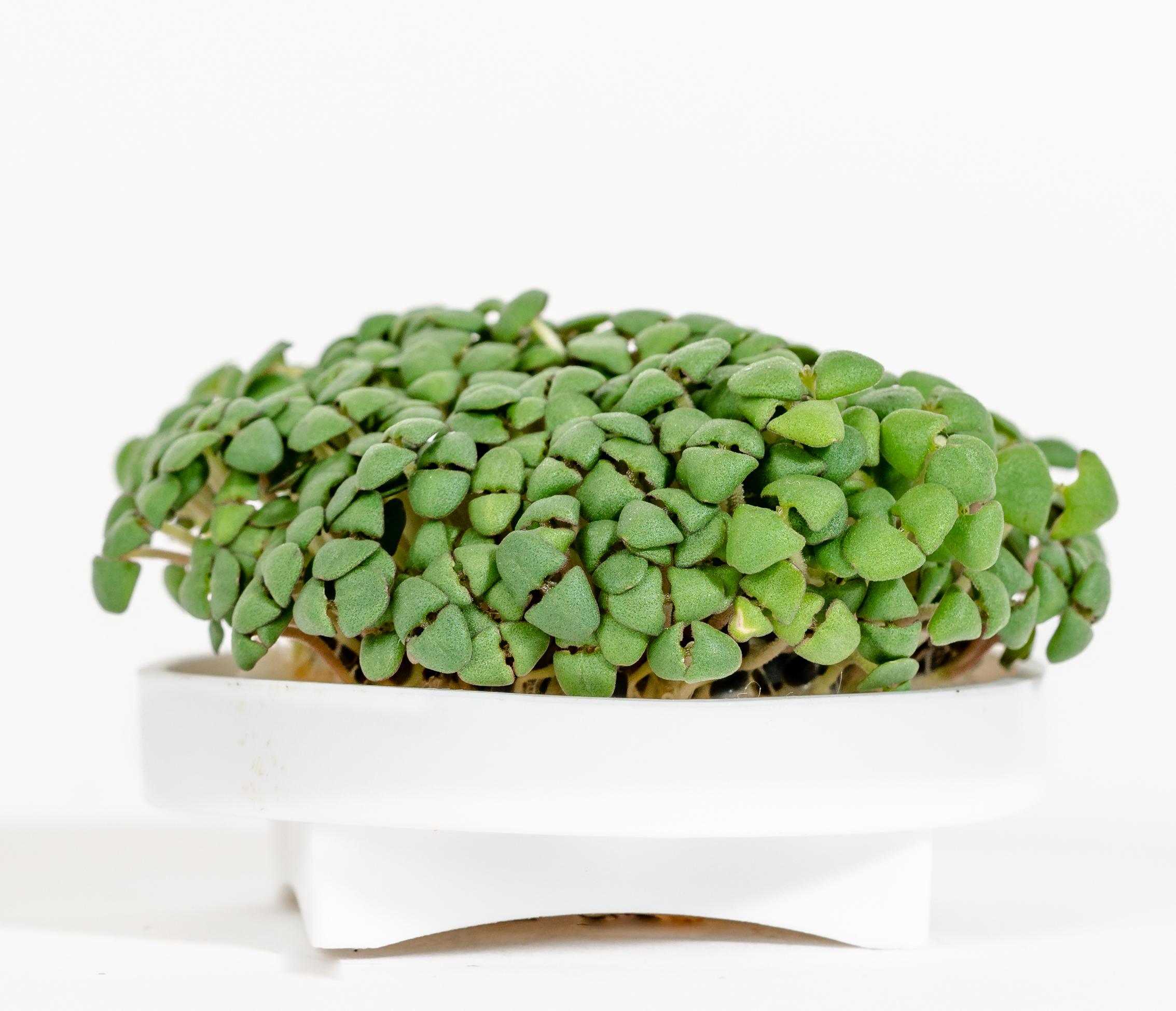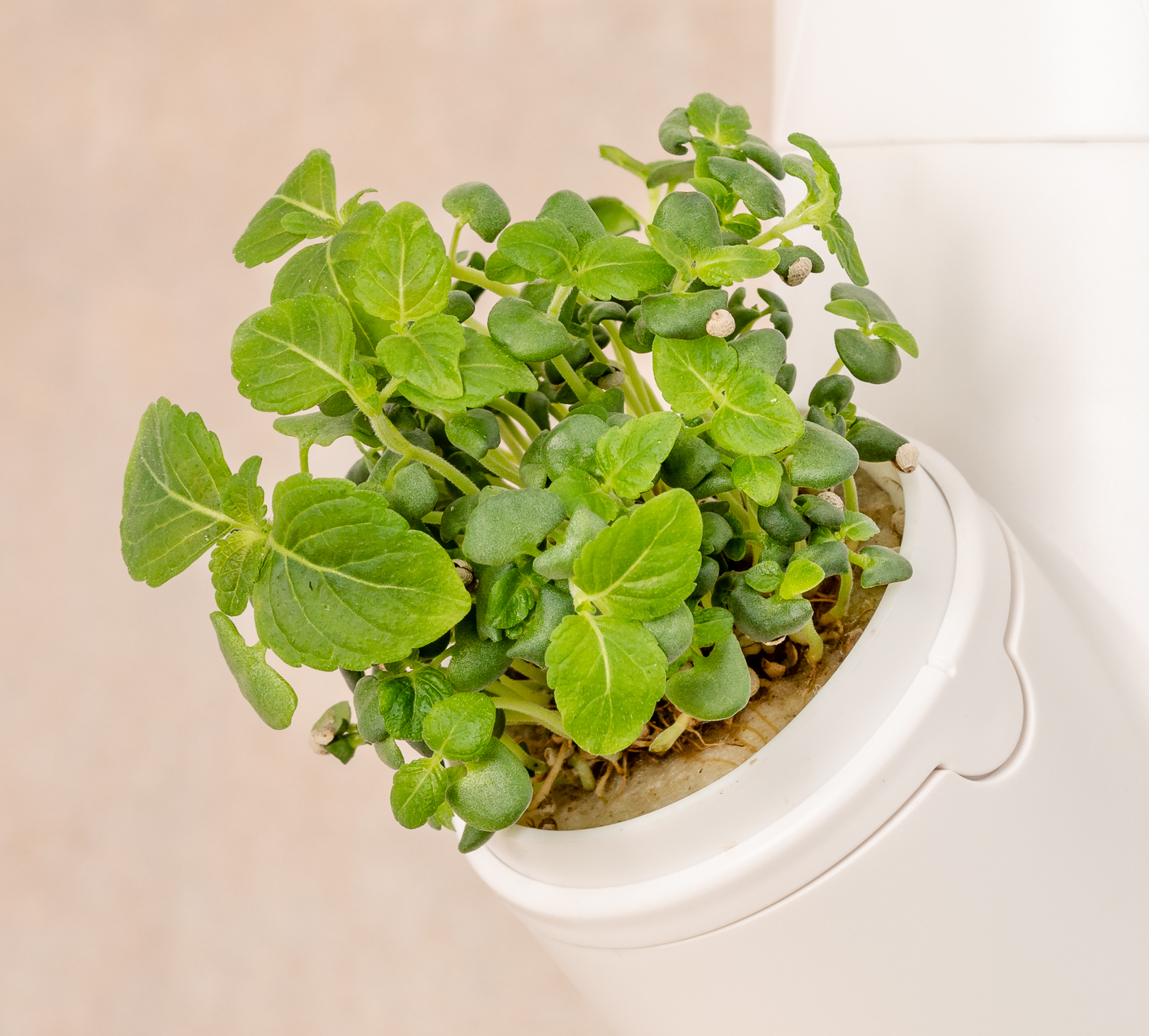Lemon Basil Microgreens & Baby Greens
🌱 Days to Sprout: 4-7
😋 No Plant Food
✂️ No thinning
🍅 Days to Harvest: 15-20
💡 Location: Nursery, then Gardyn (optional)
📏 Plant Size: < 6 in
💚 Care Level Rating: Beginner
Origin
Chefs in San Francisco first used Microgreens in the 1980’s. By the 90’s, Microgreens’ popularity had spread across America and has been growing ever since. While initially there were only a few types available, today there are over 25 unique Microgreen varieties.
Qualities
Lemon Basil puts a slightly sweet, lemony twist on the classic Italian Basil flavor. It grows very short as a Microgreen, so we recommend growing these into Baby Greens for a larger and easier harvest.
Often referred to as “plant sprinkles” or “plant confetti”, Microgreens are the first leaves and second stage of a plant’s growth (sprouts are the first stage, Baby Greens the third). Microgreens are dense with nutrients, containing up to 40% more nutrients than the same plant when eaten at maturity, earning them a spot as a superfood. Microgreens have particularly concentrated levels of vitamins C, E, and K, as well as lutein and beta-carotene.
Baby Greens also provide a hefty dose of nutrients while offering a larger harvest and slightly mellowed flavors compared to their Microgreens counterpart.
Use
Try Lemon Basil anywhere you'd like a bright, citrusy pop of flavor, or as a substitute for Italian Basil. Microgreens and Baby Greens are perfect for adding to any meal to fill in nutritional gaps or add a pop of color and texture. Try them in salads, sandwiches, tacos, smoothies, stir-fries, curries, soups, pasta, pizza, omelets, and so much more!
Care & Harvest
💧☀️ Microgreens are incredibly fast-growing and easy to care for. Ensure your nursery always has enough water for the wicks to reach, and keep your nursery either on your Gardyn’s lid or on a warm, sunny windowsill.
🫶 Microgreens push off the cover paper as they grow, typically around days 3-10 of growth. Let the plants do most of the work, as pulling off the paper too early could damage them. If the paper comes off before all of the seeds have germinated, rotate the plate so the unsprouted seeds face the back of your Gardyn and away from the lights. Gently place the cover paper over the unsprouted seeds for another 24 hours to help them continue germinating, then remove it.
Learn more about the Microgreen-Baby Green life cycle here.
🤓 Note: Lemon Basil seeds are mucilaginous, meaning they become jelly-like once wet. This coating helps protect the seeds and retain moisture. You may see this when removing the cover paper, but it’s nothing to worry about and will disappear as the sprouts continue to grow. If the rest of the Microgreens sticking out from under the cover paper appear ready to have the cover paper removed and there is just one section still stuck to the paper, mist the paper liberally with clean water, then carefully peel away the paper while wet. Once the cover paper is removed, you should see the affected area of Microgreens that were stuck bounce back within a few days, as long as their leaves are still intact. The goopy material left behind will also disappear as your Microgreens grow.
Once you remove the cover paper, it’s also best to remove the nursery’s lid to increase air circulation and let the cotyledon leaf pair fully open.
🌱 You can harvest Lemon Basil Microgreens within 15-20 days of starting them. For the most flavor and richest nutrients, aim to harvest when you see the cotyledon leaf pair fully open. However, for a larger and easier harvest, we recommend taking Lemon Basil Microgreens at this stage and growing them into Baby Greens on your Gardyn once the roots are about 2 inches long - learn how here!
✂️ To harvest, use clean scissors to cut your Microgreens or Baby Greens just above the seed pad. You can harvest the entire seed pad at once, or over time (harvested seeds will not regrow).
Our Plant Health & Nutrition Team thoroughly tests each variety we offer to bring you the most flavorful and high-quality plants. We regularly rotate our plant portfolio, so please note, availability varies.


